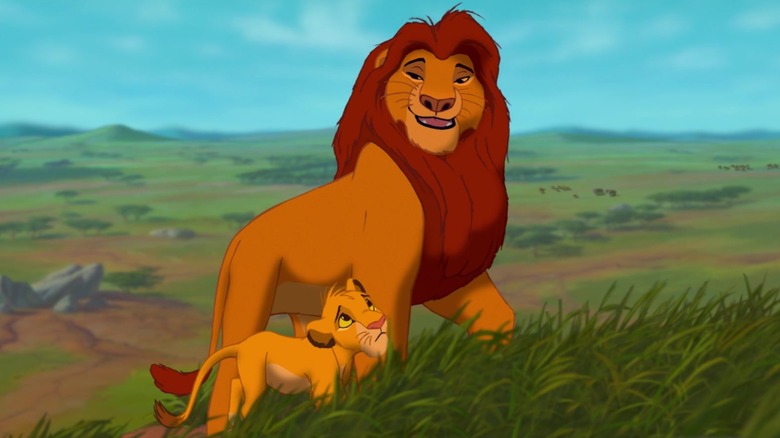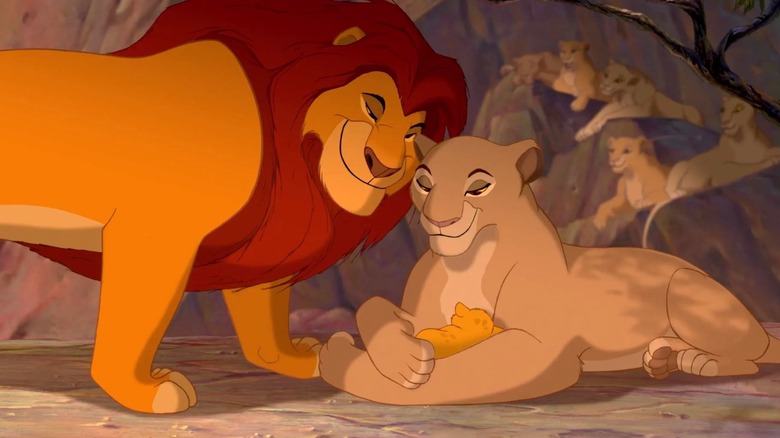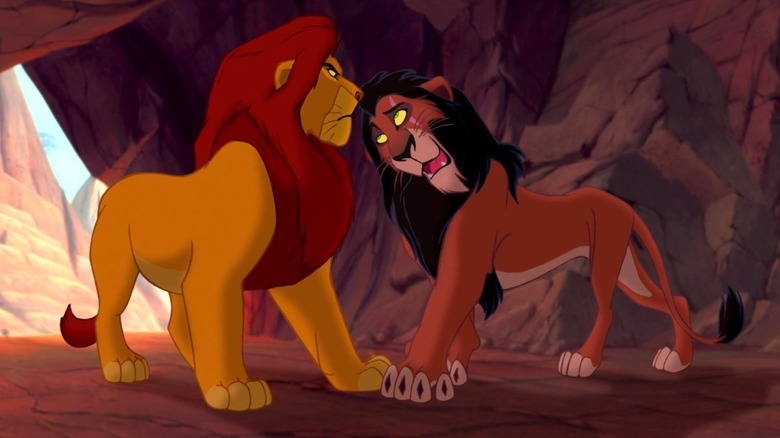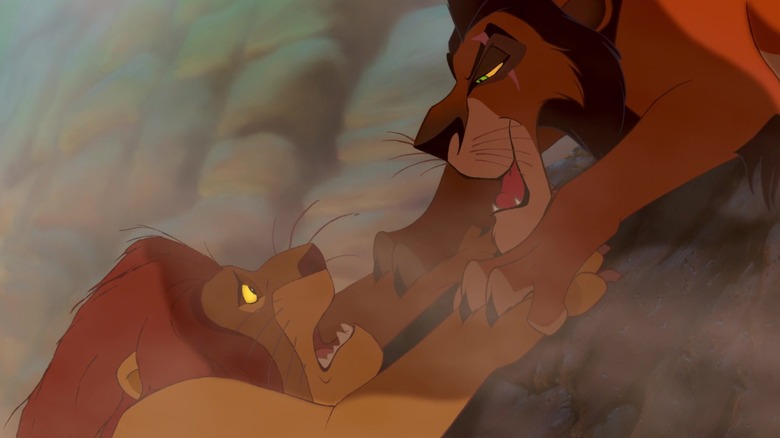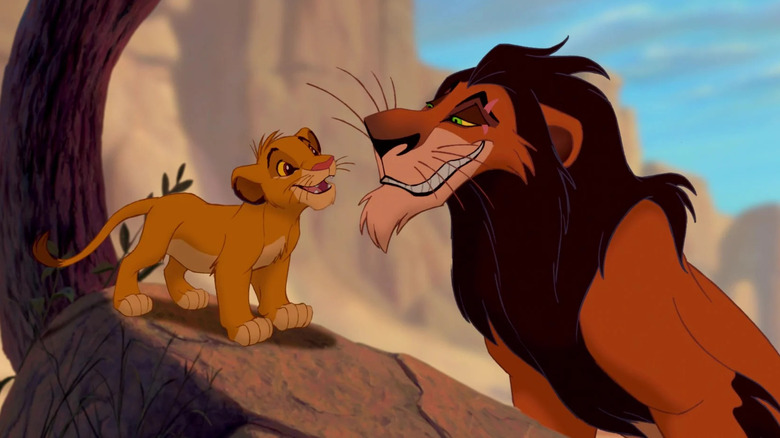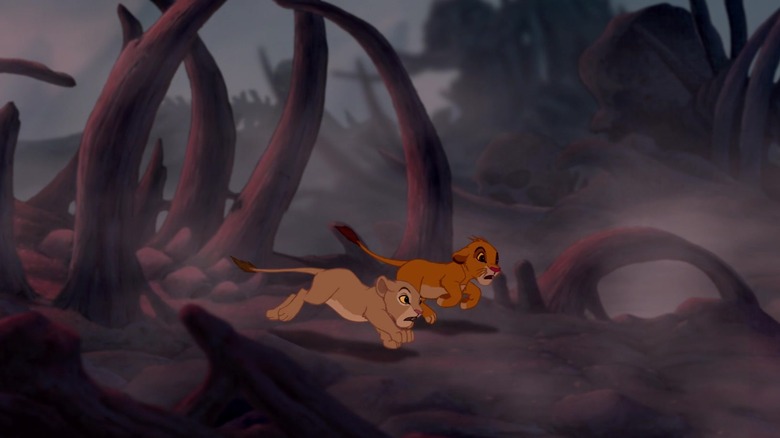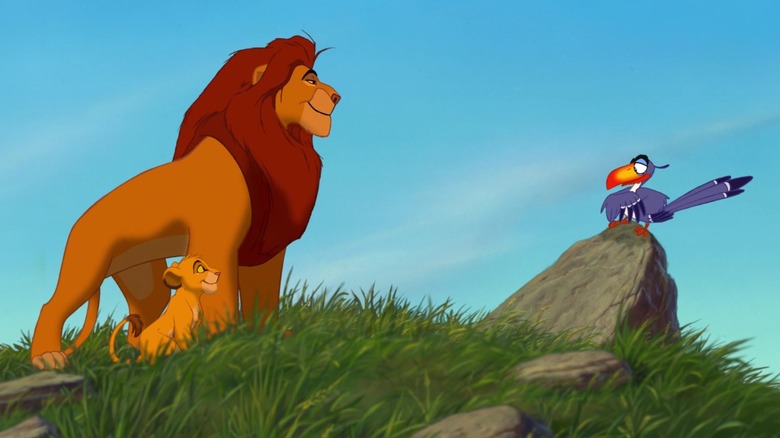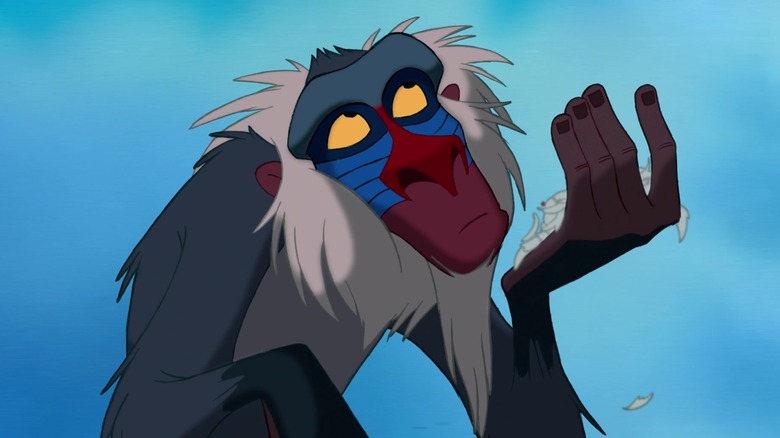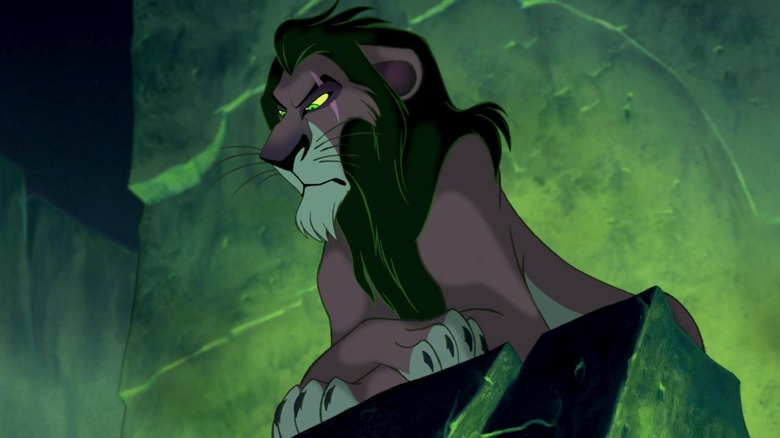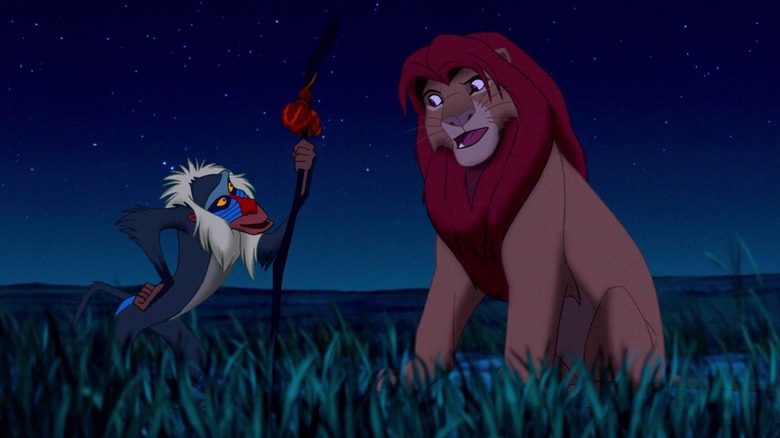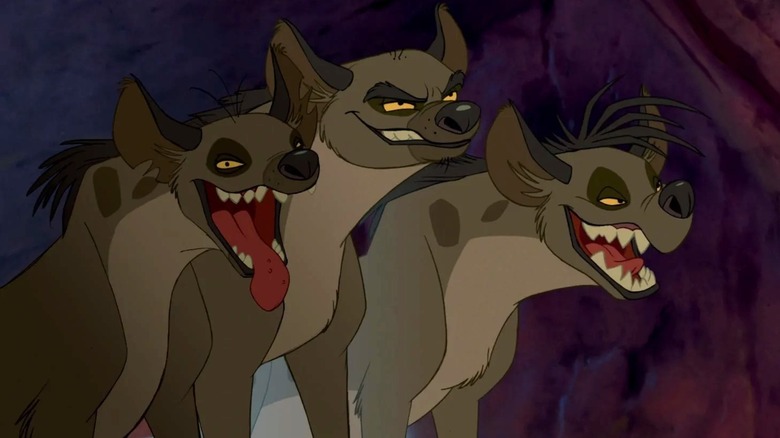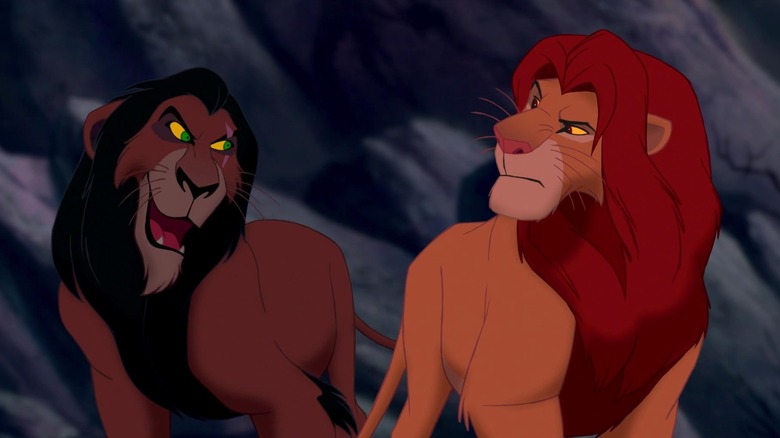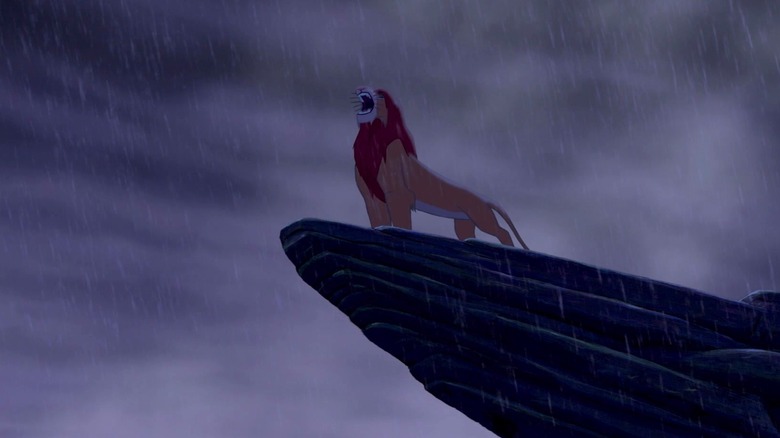We Rewatched The Lion King And It's Completely Different Now
Contains spoilers for "Mufasa: The Lion King"
2024 marks 30 years since moviegoers were introduced to all the engaging characters and catchy songs that turned Disney's animated film "The Lion King" into a phenomenon. Many people rewatch this movie for its beloved, multifaceted story (which was at the center of a controversy that Disney probably wants you to forget about). The film combines action, romance, and drama in order to present a story about the meaning of family and the struggle to move forward while facing your past. The 1994 blockbuster is also nostalgic viewing for those who grew up in the 1990s, and a rewatch gives viewers a chance to pick up on the foreshadowing that they may have missed at a younger age.
After three decades, it may seem like there is not much new material for fans to discover. It's a film that continues to be dissected, however, as there is still more than meets the eye. From the use of deep symbolism to the extra examination of character relationships, our rewatch of "The Lion King" proved that there is still so much more story to uncover. Plus, the release of the prequel film "Mufasa: The Lion King" is adding even more emotional weight to a tale that already tugs at the heartstrings. Here is why "The Lion King" is completely different now.
What is The Lion King about?
"The Lion King" follows a young lion cub named Simba (Jonathan Taylor Thomas) who is learning about the kingdom that he will one day rule when his father Mufasa (James Earl Jones) is murdered by his brother Scar (Jeremy Irons). Simba is tricked into thinking that he is responsible for his father's death and runs away from home as Scar takes over the Pride Lands. Simba (voiced by Matthew Broderick in adulthood) matures under the guidance and care of Timon (Nathan Lane) and Pumbaa (Ernie Sabella), who show him a care-free way of life while establishing one of the greatest friendships seen in Disney animated movies. However, a sudden reunion with his childhood pal Nala (Moira Kelly) changes everything. It causes Simba to reflect on his past, and a visit from Rafiki (Robert Guillaume) and the spirit of his father help him realize that he needs to challenge his uncle in order to save the Pride Lands.
Since it premiered in 1994, "The Lion King" has been retold on Broadway and it got the remake treatment in 2019. In December 2024, Disney released the photorealistically animated prequel film "Mufasa: The Lion King," giving viewers a glimpse into the king's origin story. Its existence adds plenty of extra context to the animated classic.
Why Mufasa didn't kick Scar out of his kingdom
It is revealed in "Mufasa: The Lion King" that Mufasa (Aaron Pierre) is actually the adoptive brother of Taka (Kelvin Harrison Jr.), who becomes Scar. Taka is a young prince who always wanted a brother, but big events change that perspective. Seeds of resentment are sown early on as Mufasa puts his life at risk to protect those he loves while Taka remains on the sidelines. Those feelings grow stronger as Mufasa finds love and gains the respect of the animals that will help build the Pride Lands. This all gives Scar a reason to carry a big chip on his shoulder — he wanted a brother to walk side by side with, but he ended up growing up in Mufasa's shadow, something that Mufasa clearly feels guilty over.
What makes the situation all the more painful is that Mufasa apparently thinks that their relationship is starting to heal by the events of "The Lion King," unaware of how deep Scar's hatred now runs. He seems hurt by Scar's decision to not appear at Simba's presentation. Mufasa's conversation with Zazu (Rowan Atkinson) is even more telling of where their relationship lies: He tells his confidant that he is really trying with his brother, but Scar seems to have stopped caring. It's an unfortunate truth given how Scar welcomed him into his family in the prequel. Those memories of early brotherhood and Mufasa's guilt over essentially usurping his adoptive brother stop him from banishing Scar, despite all the red flags.
There's a reason Mufasa is so shocked during the cliff scene
Scar digging his claws into Mufasa's paws before dropping him into a wildebeest stampede is one of the most famous scenes in all of animation. The iconic moment propels the entire plot of "The Lion King." The audience understands that Scar is set on killing his brother, and while Mufasa knows that their relationship needs work, the shock on his face when he realizes what is about to happen is painful to behold. So why is he so surprised when Scar sends him to his death, given all he knows about his character? It's a question thoroughly answered in "Mufasa: The Lion King."
At the beginning of the prequel, a young Taka (Theo Somolu) meets Mufasa (Braelyn Rankins) as he is being chased by a crocodile. Mufasa throws himself onto a ledge and clings onto it for dear life. Taka digs his claws into his fellow cub, who is left in shock at the response. The scene lingers here for a moment so that the audience can soak up the foreshadowing. Taka then pulls Mufasa to safety, and a similar rescue happens later in the film. This is why Mufasa believes that Scar will once again save him when he is hanging from a cliff in "The Lion King."
Mufasa is no doubt remembering all those close calls from his childhood as he looks up at Scar moments before his demise. He believes that while Scar has a grudge against him, he certainly won't let him die. Scar uses that trust to his advantage, catching Mufasa off guard and giving him no time to react as he is sent tumbling to his death.
Was Scar playing the long game with Simba?
At the beginning of "Mufasa: The Lion King," Taka is thrilled to welcome the titular cub to his family, despite his father's disapproval. Take comes to regret this as he grows up and morphs into Scar, and his plan to change what was done has been a long time coming. The bad blood between the adoptive brothers is established as Taka plans his first act of betrayal in the prequel, making it clear that Scar has been trying to undercut Mufasa for quite some time, long before the events of "The Lion King."
The arrival of Simba seems to catch Scar off guard, though, considering the events of the prequel film, there's every chance that Scar has simply been biding his time. He could safely assume that Mufasa would produce an heir at some stage, and that would present Scar with the opportunity he needed. There's no way he could defeat Mufasa in a fair fight, and he's clearly not above playing dirty. He finds vulnerability in the young prince's curiosity and his need to make his father proud, and, while his plan appears somewhat opportunistic upon first watch of "The Lion King," there's every chance that Scar was planning for this moment for many years.
How Mufasa finds Simba and Nala in the elephant graveyard
The elephant graveyard scene in "The Lion King" is an iconic misadventure that puts a young Simba and Nala (Niketa Calame-Harris) in great danger as hyenas surround them. It seems as though the young lions are done for, with no hope of escape. However, seconds after the cubs tumble into the graveyard, Mufasa quickly turns up, and he is ready to fight. His response is so fast that it is almost unrealistic at first glance, but "Mufasa: the Lion King" goes some way to explaining his near-sudden appearance.
As Taka's mother Eshe (Thandiwe Newton) guides Mufasa through his adolescence, she realizes how strong his senses are. He can detect almost any smell and he can hear when enemies are approaching, even when they are a day away from arriving. These are great abilities for a hunter, but they are also handy in Mufasa's everyday life, especially as he gets to know Sarabi (Tiffany Boone) and other new animals. His ability to hone in on smells and sounds could be the reason why Simba and Nala are still alive. A subtle whiff of Simba's fur, the tapping of little paws, and a father's intuition seemingly send him into action, saving the cubs and causing the hyenas to scatter. In short, Mufasa smelled trouble and went to investigate — and it's a good job that he did.
Zazu and Mufasa's friendship goes beyond work
Mufasa and Zazu are more than work pals: They are best friends, and their deep connection shows. During the presentation of Simba, it is clear that Zazu is bowing to Mufasa not out of obligation but rather admiration for his dear friend and this new chapter for the Pride Lands. Their expressions suggest that their friendship is one that has grown as they've both aged, and their connection is explored in "Mufasa: The Lion King" when Mufasa and Taka meet Zazu (Preston Nyman) as a scout who is watching after Sarabi.
Their introduction happens shortly before Taka expresses hatred toward Mufasa, meaning that Zazu has gotten a front row seat to much of their conflict. The king's right hand shows the audience just how much he understands their strained relationship while making a joke at Scar's expense at the beginning of "The Lion King." This as he tells Mufasa that every family has a Scar, reminding him that he shouldn't take the blame for his brother's attitude. It's a moment that shows how their relationship goes beyond meetings and morning reports.
Mufasa tells Rafiki that Simba is alive
Rafiki is the sage character that is ready to give advice with a bit of magic for good measure. The origin of his powers is still one of the biggest unanswered questions in "The Lion King." However, it is clear that he is one with the spirits and nature. As such, it only makes sense that Mufasa's spirit tells Rafiki that Simba is still alive in "The Lion King."
Simba is silently struggling with his past around the middle of the animated classic, and he's wondering why his father is not helping him like he said he would. He falls to the ground and sends leaves and other plants into the air. The wind carries them straight to Rafiki, who uses these items to determine that Simba is still alive.
The direction of these leaves seems to be all the wind's doing. However, this moment is a subtle nod to the fact that Mufasa is working in the background. He knows the strength of Rafiki's connection to the spirit world, and he knows that he will help him connect with his son during this time of uncertainty. That is why he sends the leaves to Rafiki, telling him that Simba is nearby and help is on the way for the Pride Lands.
Scar's father is the source of his villainy
Deceit, anger, and wit. All of this makes up Scar's personality in "The Lion King," and it's part of why he's one of the best Disney animated villains of all time. But why is Scar like this? Well, his father Obasi (Lennie James) is partly responsible for the way he turned out. In "Mufasa: The Lion King," Obasi is disgusted by the idea of Mufasa joining the family. He calls him a stray and demands that he not live with the king, his heir, and the other male lions. He explains to Taka that blood is the only true bond. He also teaches his son that deceit is a major tool for any king.
These lessons result in Scar holding onto grudges against Mufasa, and he believes that deceit is key in resolving these conflicts. By the time we get to "The Lion King," Scar has mastered this tactic, and he uses it to control Simba and lure Mufasa into his trap. It's sad to see, especially as there was a time when Scar wasn't this way: Taka helps his brother throughout the prequel, saving him in dire situations and helping Mufasa thrive. It's these memories that make Mufasa think that Scar that still cares for him on some level.
Why Simba doesn't remember Rafiki
Rafiki and Zazu are trusted friends of Mufasa and Sarabi, so it's important that both are a part of Simba's presentation — but why doesn't Simba remember Rafiki when he is an adult? "Mufasa: The Lion King" explains that Rafiki (John Kani) ends up living a solo lifestyle after his previous tribe disapproves of his connection to nature. He comes to terms with the idea of isolation as he walks away from his home and joins Mufasa, Taka, Sarabi, and Zazu on their journey to find the promised land called Milele.
So, instead of spending time on Pride Rock with Simba, he spends his time listening to nature and the spirits who will help protect the future of the Pride Lands. It's important work that could greatly help Mufasa, who he refers to as his brother. That sense of brotherhood could be a big reason as to why Rafiki and Mufasa are able to have such a strong connection when Mufasa heads to the afterlife. As said in the prequel, you can't tell Mufasa's story without Rafiki, and Simba doesn't have a story without either of them.
Were the hyenas plotting behind Scar's back?
The relationship between Scar and the hyenas is a fickle one to begin with, but there are signs that the hyenas could have been plotting to destroy Scar way before he turned his back on them at the end of "The Lion King." Following the events at the elephant graveyard, the hyenas say they fear Mufasa's power, but they see Scar as a friend. His familial ties to the throne don't hurt, either. Plus, the food he brings to them makes him a good ally. Scar thinks he's their leader, but this is a misconception that is highlighted during the song "Be Prepared." The catchy number that encapsulates Scar's dark history plots Mufasa's demise, and it convinces the hyenas that his plan is to their betterment.
Of course, all Scar really cares about is himself, and, at first glance, the hyenas seem blind to this. But are they really? There is still hesitation as they wait for Scar's signal to start the stampede, and it is in this moment that Shenzi (Whoopi Goldberg) shows that she is the real leader of the hyenas, encouraging them to stay focused because it will work out for them in the end. When Scar tries to blame the hyenas at the close of the film, Shenzi seems to give the hyena pack her approval to attack Scar, which suggests that this was something they had discussed beforehand. It seems like this was always plan B, and Shenzi didn't hesitate when the time came to execute it.
Why is Simba mistaken for Mufasa upon his return?
Simba's return to Pride Rock is a big surprise for everyone, especially Scar and Simba's mother Sarabi — but their reactions are even more surprising. At first, both believe that he is Mufasa, with Scar visibly getting a chill up his spine. Simba corrects his mother who replies that she truly thought that her son was dead. These reactions could be a way of showing Simba how much he is like his father, but it could also mean that the spirit world has been doing some work off camera. Has Mufasa been appearing in the dreams (and the nightmares) of those he left behind?
By the end of "The Lion King," it is clear that Mufasa has been standing by Simba since his death, connecting him with Rafiki when it is time for him to come home. Scar's fear while mistaking Simba for Mufasa could indicate that his brother has been visiting him in his nightmares. Mufasa was never afraid to challenge him, so it makes sense for him to challenge his brother in his dreams if he's able to. Sarabi's reaction may indicate that her late husband is visiting her dreams, maybe reminiscing about their past and telling her that everything will be okay in the end. After all, if Mufasa can reach out to Simba, then surely he's capable of visiting other members of his family, too?
What each rainfall symbolizes
Rain is a welcome sight in the Pride Lands, an area that is sunny and bright most of the time. However, rain is more than just rain in "The Lion King." As "Mufasa: The Lion King" explains, the rain is more of an event because it signals that someone's destiny is upon them. Rainfall ushers in two huge moments in "The Lion King." A deluge takes over the Pride Lands shortly after Simba is presented to the kingdom. This signals that the kingdom has an heir to the throne, and that it is now Simba's time to learn the ropes from his father. It could also be a foreshadowing of Mufasa's death because his demise is yet another transition period for the kingdom, with Scar heading toward his own destiny.
The rain comes again toward the end of the film. Following Scar's defeat, rainwater washes away the destruction seen across the area. Simba and the lions roar as the rain comes down, signaling that they know that a new time has come and Simba is now fulfilling his destiny as he becomes king. The rain also ties in nicely to the circle of life as it brings growth to a land that has been depleted, giving the animals new food and scenery to enjoy. After watching "Mufasa: The Lion King," you'll come to appreciate the significance of the rain sequences in "The Lion King" all the more.
